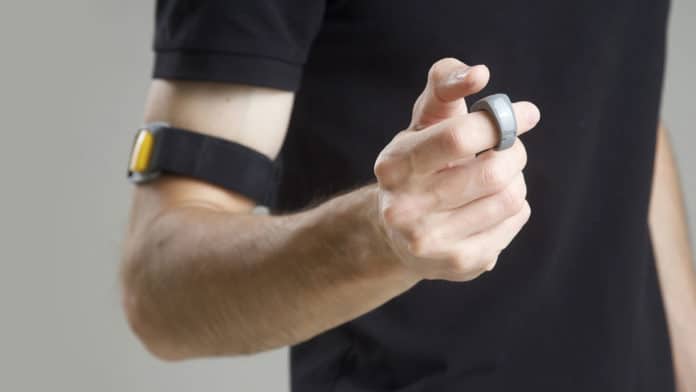The world of wearable devices is rapidly evolving, with more or less niche products that companies try to make increasingly useful and accessible to the general public. This is the case of smart rings, which could become increasingly useful devices thanks to partnerships like the one announced between Finch Technologies and AR glasses maker Nreal.
The two companies have joined forces to develop a new ring-like wearable for controlling virtual and augmented reality devices using gestures. This wearable certainly has more generous dimensions than a classic smart ring or a normal ring but offers many more features, thanks also to the presence of a small touchpad on one side and a force sensor on the other.
The controller consists of two parts: a FinchRing and a separate device called the FinchTracker worn on the upper arm for full 6-DoF tracking functionality without requiring optical cameras. The FinchRing is located on the second joint of the index finger with a clip that comfortably fits nearly all finger sizes for all-day wear.
If the user only puts on the ring, then it will work like a regular inertial controller, allowing you to direct the pointer to the desired objects. And when two sensors work simultaneously, the system creates a kinematic model of the hand and allows you to track the current position of the end of the hand in space. The sensors can also recognize some simple hand gestures; for example, the user can grab a virtual object with his hand with their help.
The FinchRing complements inputs such as optical fingers tracking, eye-tracking, voice, and keyboard without taking the FinchRing off. It works indoors and outdoors, not impacted by lightning conditions or weather. The device can not only be used for VR or AR headsets but also for PCs, tablets, or phones with open-air gestures.
The FinchRing is 13mm wide, weighs 18 grams, and is at most 5mm thick. The devices are designed for four hours of active use on a single battery charge. It can be recharged to 80% in just 20 minutes.
Initially, the developers implemented support for Nreal augmented reality glasses and the Unity game engine, but in the future, they plan to adapt the devices for the main augmented and virtual reality platforms, as well as popular operating systems. Unfortunately, the cost and date of availability of the device have not been disclosed.
